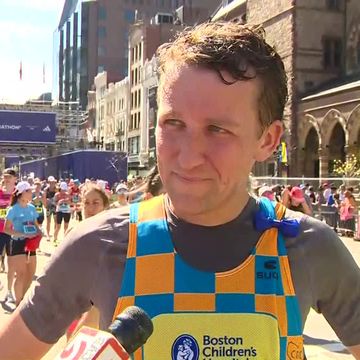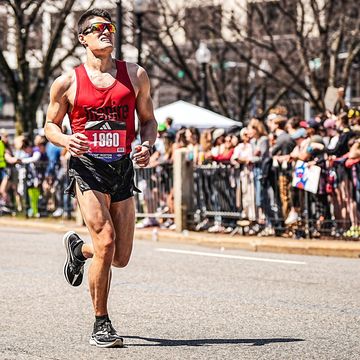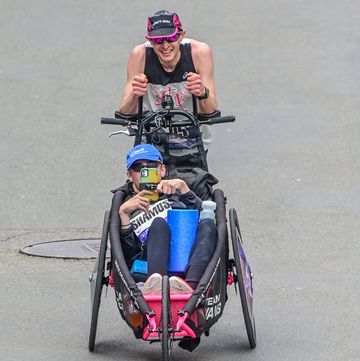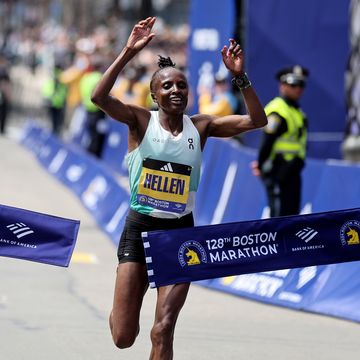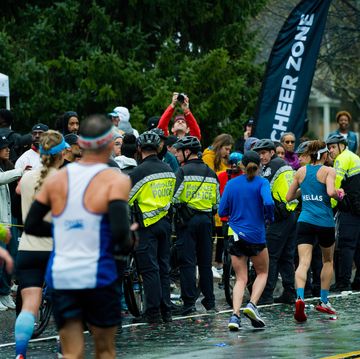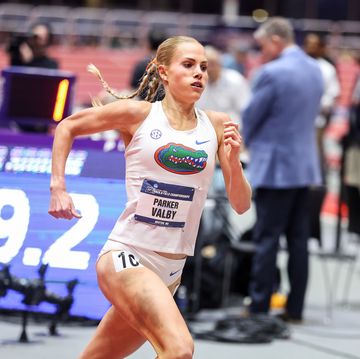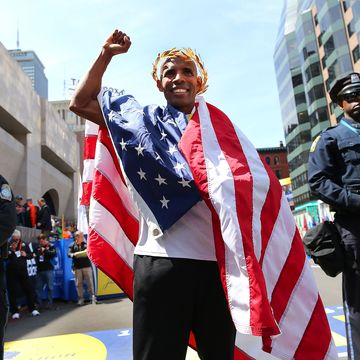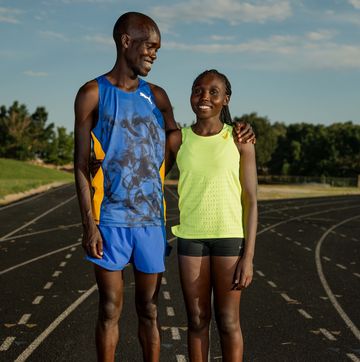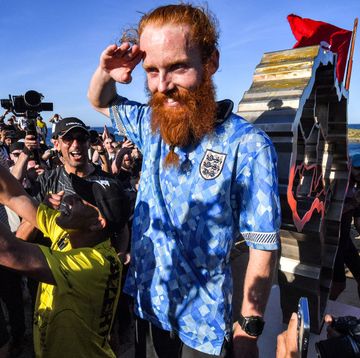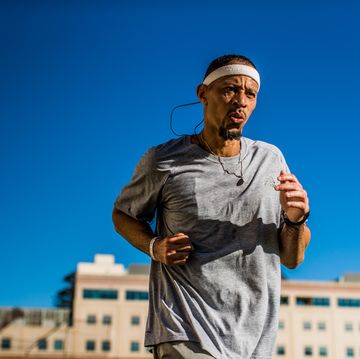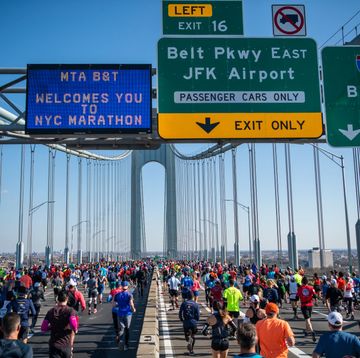Two of the three U.S. women who will run the 10,000 at the IAAF World Championships in Beijing on August 24 are well-known to running fans. Molly Huddle and Shalane Flanagan are regarded as the two best American woman distance runners in the country right now and are the two fastest American women ever at the distance.
But what about the third woman on the team, Emily Infeld?
She's a former NCAA indoor 3,000 champion, but with a history of frequent and severe injuries, bouts of fatigue, and, in her words, “a lot of emotional struggle the last couple of years,” is far from a household name. Now healthy and training with Flanagan, she’s ready to live up to the potential she’s long shown.
Infeld’s journey to Beijing began when she ran a 10,000 because her Bowerman Track Club coach, Jerry Schumacher, didn’t think she’d gotten enough of her speed back to do a decent 5,000.
At the Payton Jordan Invitational at Stanford on May 2, all Schumacher expected from Infeld was something below 32:58 to qualify for the USATF Outdoor Championships. She’d recovered from the second of two sacral stress fractures—which prevented her from running for six and two months, respectively—and “had just a month of workouts under my belt,” Infeld told Runner’s World Newswire.
She entered the race with instructions to cruise through the first four miles at 5:15 pace. Instead, “I went out in dead last through first mile, and it was 5:07,” Infeld said. She ended up running a personal best of 31:38.71.
After that, to prepare for the U.S. championships, Infeld was off to altitude training at Park City, Utah. With Flanagan, “we did a 16-mile long run up here and the first eight or nine were moderate and then we were at 6:00 pace. We had a few miles under 6:00,” Infeld said. “Oh gosh, I felt terrible.” After the run, Flanagan told her, “I promise you, you’re going to feel better running the 10K [at the U.S. championships] than you did during that run. That’ll probably be way harder than racing.”
“And she was right,” Infeld said. “That [training run] was the worst I’ve ever felt. I was feeling sorry for myself after that run. I was clearly working a system I needed to work. At the time it’s not fun, but I feel like it has to be beneficial in some way if I don’t like it so much.”
Infeld joined Schumacher’s Oregon-based training group in the fall of 2012 after a collegiate career at Georgetown, which included that 3000 indoor title and runner-up finishes in NCAA cross country and the outdoor NCAA 1500 and 5,000.
As a young pro, she began building an aerobic base and qualified for the U.S. team at the 2013 world cross country championships, where she placed 21st. But training at Mammoth Lakes, California, “I just bonked,” said Infeld. ”I just dug myself in a hole, training a bit too hard, running every day with the guys, which was not smart.”
She was adding core work and lifting weights, something she hadn’t done in college. “It was just dumb. I was doing far too much and kind of changed everything all at once,” she said. “And I don’t think I was so vocal about how tired I was feeling.”
She lasted only six of a scheduled 10 weeks at Mammoth. She skipped the 2013 U.S. outdoor championships and took much of the summer off.
Infeld came back strongly the second half of 2013, with a late-season 8:41.43 for 3,000 meters in Rieti, Italy, followed by runner-up finishes at the Tufts 10K for Women and behind Huddle at the USA 5K in Providence, Rhode Island, and the NYRR Dash to the Finish Line 5K the day before the New York City Marathon.
Then came more disappointment.
“I got a little too excited,” Infeld said. “I upped my mileage. I did a little too much too soon and got a stress fracture,” her first. She was out for half a year.
She contemplated quitting. “I love running so much and it’s something I’m so passionate about and I want to be competing for as long as I can,” Infeld said. “But I was thinking maybe I can never even jog again, which is devastating to think about. I had a lot lows. I feel like I was in a bit of a dark place for a while. It’s hard when something you love so much is taken away from you. It seemed like my purpose was gone.
“I have that mentality where I just want to keep pushing and pushing until I break,” Infeld said. At the end of last year, after the second sacral stress fracture, “I realized I needed to tone it down a bit.”
In practical terms, that might mean that, although she does most of her workouts with Flanagan, she may need more recovery, and more slow days, than her accomplished partner. “I might have to do the second run of the day on my own,” she said. “Right now I’d rather err on the side of caution.”
Infeld’s sister Maggie, a Big East 1500 champion, was a fifth-year runner at Georgetown when Emily was a freshman, and the two trained together. Emily, who won four Ohio States high school 800 titles and set a state 1600 record of 4:41.37, was in grade school when she watched Maggie win a race and told their mother, “I want to win, too.”
In hindsight, she feels fortunate to have had a high school coach, Jim Emery, “who didn’t work us too hard, he wasn’t super intense, he wanted us to have fun,” Infeld said. At the Foot Locker Cross Country Championships, “there were girls there who were already running like professionals. I remember going out for ice cream the night before the race and everybody else was on their strict diets.” Emery’s approach, she’s concluded, “prevented me from burning out, and had me falling in love with running.”
By email, Flanagan told Newswire that Infeld is “a super sweet girl and is always giggling. She is a great teammate to everyone and oozes positive energy.” That sentiment is echoed at the Bowerman Track Club website, which describes Infeld as “the most beloved member of the BTC” and “the glue that holds the team together—mainly by laughing at everyone’s jokes.”
Right now, Infeld and Flanagan are training at altitude in Park City. They will head back to Portland in early August and may jump into a 3K or 5K race there. They’ll then spend two weeks at the USATF camp in Japan before going to Beijing.
“I’m curious to see if it will go out hard,” she said of the world championships 10,000. “There might be mass carnage at the end. I’ll probably go out with Shalane and Molly and see where that puts me.
“I feel like after a lot of hard work miles the last couple of years, I wasn’t able to showcase it,” Infeld said of the fatigue and fractures that sidetracked her. “It makes me happy that I’m finally healthy at the right time.”


